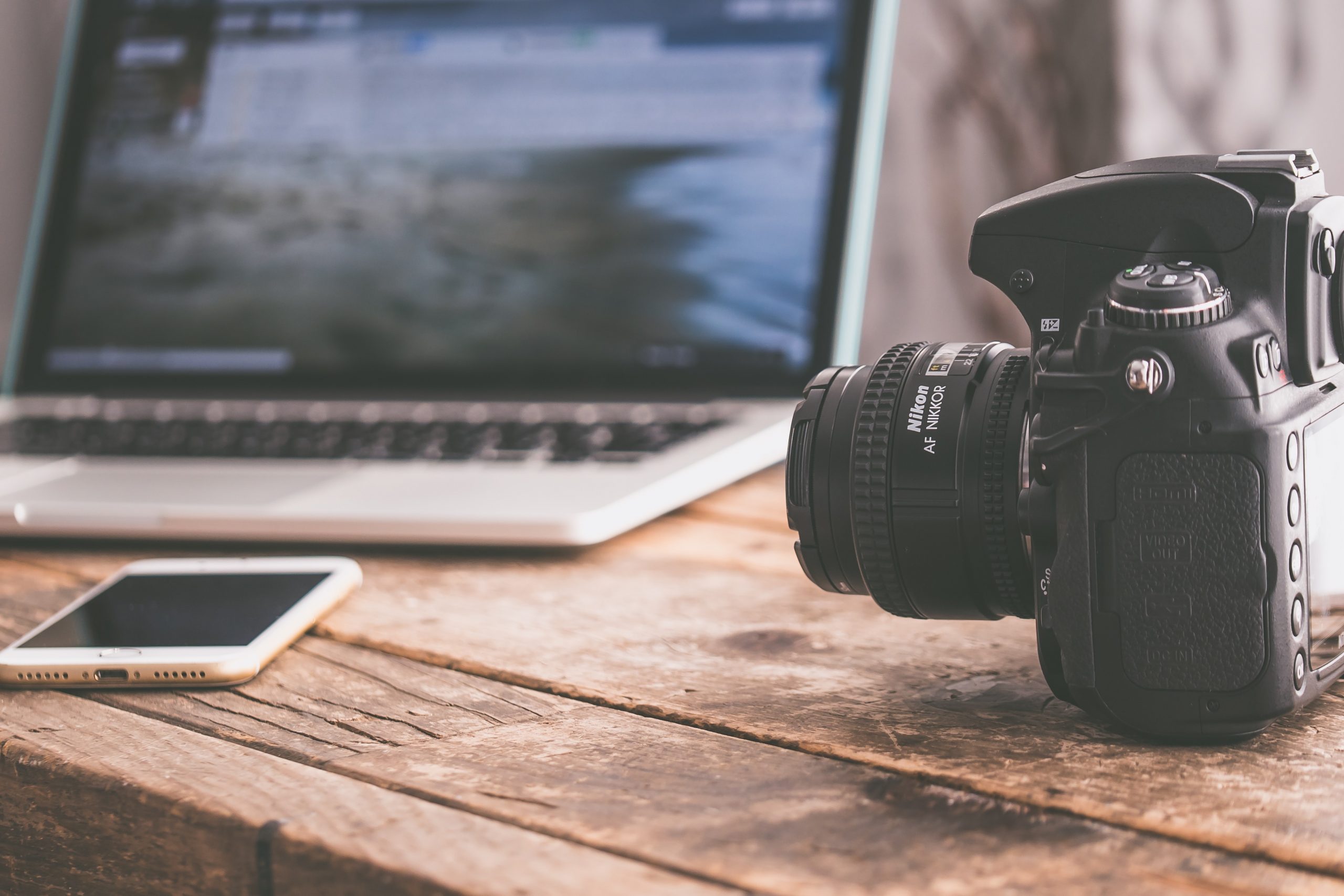Double Elvis Productions is an audio-first media company specializing in podcasts and music-focused content. The company works with artists and creators as well as writers, engineers, producers, and other media companies to produce, distribute, and market unique podcast productions.
While many of their programs start as podcasts, Double Elvis hopes to develop each show as a platform which may extend to television, film, books, live events, and merchandise formats. One of the company’s shows, Dear Young Rocker, was created and is hosted by Chelsea Ursin ’15, an MFA graduate from Emerson College.
Our office recently connected with Jamie Demas, Business Manager, and Brady Sadler, Partner & Executive Producer, to learn more about Double Elvis and what sort of career opportunities the company has to offer.
How would you describe the culture of working at Double Elvis?
Brady: “I’d say it’s a creative culture where we are really encouraging people to do their best work, experiment, and utilize this medium for all of the opportunities it presents… Music is at the core of everything that we do, but that leaves a lot of room for experimentation and innovation. I think, culturally, creativity is really one of our core values, but we’re also trying to develop the kind of culture where people can grow in their own pursuits as artists.
For example, we work with someone like Chelsea [Ursin], who developed Dear Young Rocker, but has lots of different ambitions to do different things. We’re hoping this can be a place that people can find their own voices and be able to grow in their own pursuits creatively while we build these shows and build the company.
We’re a remote company. We work remotely and everyone works independently, which is definitely something that fits with certain types of individuals. If you like having a lot of autonomy, if you’re really self-directed and self-led and self-motivated, it works great. There’s certainly lots of time for interaction. These days it’s mostly through virtual communications, though prior to this we’d have monthly meetups with our team and we very much created a collaborative environment.”
Jamie: “We haven’t been able to get together in person to do what we want to do. Hopefully we’ll be able to do that again. I think it’s nice when you do have a remote team to be able to get together monthly to just share ideas. We’re pretty good at sharing ideas, but I think it would be nice. Hopefully in a year we’ll be able to get together more often.”
What are some examples of shows or projects Double Elvis is working on?
Brady: “I think probably the best example would be Dear Young Rocker. It’s a coming-of-age story which deals with things like mental health, gender dynamics, and body image. It’s a very honest, raw, entertaining, but real portrayal of life. [Chelsea] started it as her thesis and imagined doing it as a book project. After deciding to adapt it into a podcast and releasing some episodes independently, we met up and decided to help her produce and release the podcast. We’ve now just completed the second season of her podcast, which is 24 episodes. We’re beginning to plan for season three and we have lots of other exciting things that we’re developing around the Dear Young Rocker platform.
Another example would be a show called Here Comes the Break, which is a scripted fiction series that is also going to, within the fiction and story, showcase cameos from real emerging hip hop artists. For this project we partnered with Def Jam Recordings and all of those cameos will be Def Jam artists.
The show is based on a story of some teenagers who are actually producing their own podcast and interviewing artists. We wove the fiction and the cameos together. We’re going to do some really innovative things in that we’ll be releasing new tracks exclusively from these artists for the first time in the podcast. And then, in the same day after the podcast launches, those tracks will go wide on streaming services. At the end of the ten episode season we’ll have a ten song soundtrack from that podcast. It’s a really fun and different way to blend storytelling and music and artist discovery.”
How has your work been impacted by COVID-19?
Jamie: ” I think we were fortunate because we’re not dependent on being together. In terms of the actual recording, people have been really great about adapting to doing their work at home. We send microphones out to people in their homes and give them instructions. We have software we can use that makes them able to do the recording in a really high quality way and occasionally we can still do small groups at a recording studio, but we’re less reliant on that.”
Brady: “From a business standpoint, the podcast industry has never been stronger. It grew listenership through COVID. It’s proved to be a very strong medium that can thrive in this current dynamic we’re living in. Even before COVID, data showed that more podcast listening happened in the home than it did out of the home and that’s just accelerated.”
What are some of the career opportunities available at Double Elvis?
Brady: “We’re a start up. We’ve had a lot of early success, but we’re definitely still in our infancy for our vision for how we’re going to grow and this team we will ultimately build. One thing we’re always looking for is talented writers. Every project that we do needs one or more writers and especially people who like to write scripted, nonfiction. There’s a lot of work that we do around historical themes — again, all in music, but storytelling around that. It’s different from your typical sort of history writing. We try to make it entertaining and fun. So we’re always looking for creative writers interested in coming onto a project.
From a marketing perspective, all of our shows need to find audiences. So that’s another department we’re going to be growing very quickly. It will be everything from digital marketing and social media to graphic design to data and analytics and copywriting, marketing planning. All of that work goes into creating a successful podcast.”
Jamie: “Eventually I think there could be some opportunities in the audio engineering space as well. As we bring more shows into production, we’ll be growing in the next six months for sure.”
What are some of the skills or skill sets you look for in applicants?
Jamie: “Writing. We’re looking for creative writers and also marketing and social media. I know a lot of young people are naturally good at that. Anything creative. From a marketing perspective we need creative people as well coming up with creative ways for us to market and find the audiences we want to find. Artistic, creative. In terms of the audio side, the skills they’re getting in Emerson’s programs are what we’re looking for. People able to do mixing and sound design.”
Brady: “I think just being able to multitask and also just being curious about culture and the way people consume content. Folks who study that stuff or just understand the way media moves.
Media moves so quickly now. I think the perspective of young people who consume media in a different than ways other generations might. That’s super helpful because we have shows that target people who are aged 16 and up. Many of our shows have audiences that span decades. So we have to look at those shows and think about different ways of marketing them. Some of those might require thinking about different audiences, diverse audiences, and really coming up with unique ways to target them.”
What excites you the most about working for Double Elvis?
Jamie: “The products and what we’re creating is just really cool and different and exciting. I love all of our shows. I was always a big music fan and we work with a lot of musicians. It’s just kind of how it works out. Because of the nature of our podcasts, a lot of our creators are musicians. I just think that we’re putting out some really interesting shows that I enjoy listening to.”
Brady: “That reminds me of one other thing I think we should have added to skillsets or values is a love and passion for music. That’s definitely a key to working with us given the content.
I would say the thing that excites me the most about working at the company is that we are creating this platform for artists. We are working with so many different artists and such a diverse range of voices. Now we’re able to tell stories that are inspiring, entertaining, and educational in some cases. To be a part of something that results in a mix of all of those things and has an impact on people. The feedback we get for instance with Dear Young Rocker and what Chelsea has done there to help people feel seen and to feel like their experiences are validated and that just because they’re different doesn’t mean they’re less than anyone else.
It feels good seeing the comments and the reviews coming back when you know that it has made a difference. The fact that it also is doing that in such a creative way and by giving an opportunity many different artists to have a career, to build their own sort of canon of work is really fun and something I’m really proud of.”
Do you have any advice for young professionals?
Jamie: “I would just say for young people, become good networkers. I think it’s just something that’s really important. Networking is something that everyone is going to need throughout their career. The earlier you can start making connections and thinking about ways you can help other people in their careers. Even just through introductions and helping people in any way you can. What goes around, comes around. The more you put yourself out there to help other people, the more people will help you and the more it will help your career.”
Brady: “I would echo the networking piece and, with that, don’t be afraid to ask for help. Don’t be afraid to reach out to anybody. Be really proactive in reaching out to someone. Yes you can ask for help, ask for advice, but you can also share ideas. Maybe you don’t think you have as much experience, but you have your own unique perspective and companies need that. Businesses and brands need that. Don’t be afraid to lob some ideas over to whoever you’re reaching out to a sense of how you think.
The last thing I would say is find a team of people. Find one or more collaborators that are good at something you’re not. A piece of a puzzle to something you want to accomplish and just make something. Whatever it is, do it. Take action and create something. It won’t be perfect, it won’t be the ideal version of what you thought, but it will get you started and you don’t know whose attention you might get or what it might demonstrate. That’s sort of a new way of creating a portfolio.”



